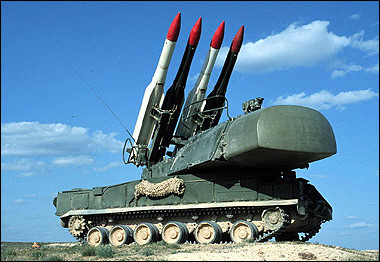Re: The Rise of the Russian Empire: Russo-Armenian Relations

Russia sells Iran sophisticated missile systems capable of repelling US or Israeli air or missile assaults.
The first of 29 Tor-M1 systems in the $700m deal have been delivered to Iran by Moscow despite US opposition to their sale of a weapon widely regarded as the most advanced of its kind in the world. Some Iranian and Russian air defense experts say its full deployment at Iran’s nuclear installations will make them virtually invulnerable to American or Israeli attack in the foreseeable future. Therefore, no more than six months remain, until the Russian Tor-M1 systems are in place, for any attempt to knock out Iran’s nuclear weapons industry.
DEBKAfile’s military sources disclose that Iran’s military and Revolutionary Guards units are on top war alert for the second month. Their fighters and bombers are parked on the runways ready for takeoff, their surface missiles including Shehab are a button’s push away from firing and their war ships and submarines cruise out at sea in the Persian Gulf and Arabian Sea. Tehran is determined not to be caught napping by any surprise attacks. The fact that officials in Moscow, albeit unidentified, announced the Tor-M1 missile’s delivery to Iran indicates the Russian president Vladimir Putin has decided to shrug off US objections, including a request put to him in person by President George W. Bush when they talked in Moscow and Hanoi earlier this month.
DEBKAfile adds some information about this super-missile: The first batteries to be delivered come ready with Iranian crews trained at Russian air defense corps facilities. The advantages of the Tor-M1 system are principally its ability to simultaneously destroy two targets traveling at up to 700km/h in any weather by day or night; its powerful, jamming-resistant radar with electronic beam control, and its vertically-launched missiles’ ability to maintain high speed and maneuverability throughout their operation. According to military experts, the 3D pulse Doppler electronically beam-steered E/F-band surveillance radar feeds to a digital fire control computer range, azimuth, elevation and automatic threat evaluation data on up to 48 targets.
The 10 most dangerous targets are automatically tracked and prioritized for engagement. The maximum radar range is billed as 25 kilometers but may be more. On the lower right side of the tracking radar, which is located at the front of the turret, is an automatic TV tracking system with a range of 20 km that enables the system to work in a heavy ECM environment. Last spring, the United States called on all countries to stop all arms exports to Iran. Link: http://www.debka.com/

Russia sells Iran sophisticated missile systems capable of repelling US or Israeli air or missile assaults.
The first of 29 Tor-M1 systems in the $700m deal have been delivered to Iran by Moscow despite US opposition to their sale of a weapon widely regarded as the most advanced of its kind in the world. Some Iranian and Russian air defense experts say its full deployment at Iran’s nuclear installations will make them virtually invulnerable to American or Israeli attack in the foreseeable future. Therefore, no more than six months remain, until the Russian Tor-M1 systems are in place, for any attempt to knock out Iran’s nuclear weapons industry.
DEBKAfile’s military sources disclose that Iran’s military and Revolutionary Guards units are on top war alert for the second month. Their fighters and bombers are parked on the runways ready for takeoff, their surface missiles including Shehab are a button’s push away from firing and their war ships and submarines cruise out at sea in the Persian Gulf and Arabian Sea. Tehran is determined not to be caught napping by any surprise attacks. The fact that officials in Moscow, albeit unidentified, announced the Tor-M1 missile’s delivery to Iran indicates the Russian president Vladimir Putin has decided to shrug off US objections, including a request put to him in person by President George W. Bush when they talked in Moscow and Hanoi earlier this month.
DEBKAfile adds some information about this super-missile: The first batteries to be delivered come ready with Iranian crews trained at Russian air defense corps facilities. The advantages of the Tor-M1 system are principally its ability to simultaneously destroy two targets traveling at up to 700km/h in any weather by day or night; its powerful, jamming-resistant radar with electronic beam control, and its vertically-launched missiles’ ability to maintain high speed and maneuverability throughout their operation. According to military experts, the 3D pulse Doppler electronically beam-steered E/F-band surveillance radar feeds to a digital fire control computer range, azimuth, elevation and automatic threat evaluation data on up to 48 targets.
The 10 most dangerous targets are automatically tracked and prioritized for engagement. The maximum radar range is billed as 25 kilometers but may be more. On the lower right side of the tracking radar, which is located at the front of the turret, is an automatic TV tracking system with a range of 20 km that enables the system to work in a heavy ECM environment. Last spring, the United States called on all countries to stop all arms exports to Iran. Link: http://www.debka.com/









 I'd bet on it.
I'd bet on it.
Comment